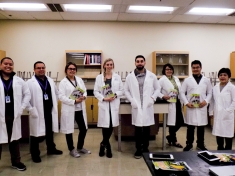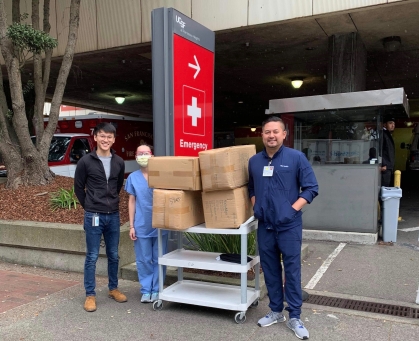
A Publication for Alumni & Friends of Rutgers Robert Wood Johnson Medical School

The Intersection of Science and Service: Eddie Lu ’24 Founded a Nonprofit to Promote STEM for Young Learners

Future physician. Chief technical officer. Community outreach coordinator. Part-time barista.
These are a few of the roles that keep second-year student Edbert (Eddie) Lu busy. Eddie explains that he has adopted a plethora of activities because of his passion for service. Service is what led Eddie to medicine, why he started a nonprofit organization, and the lens through which he envisions his future career.
Eddie completed his bachelor of arts degree in molecular and cell biology with an emphasis in immunology and pathogenesis of infectious diseases, at the University of California, Berkeley. After graduation, he spent three years in the lab of William A. Weiss, MD, PhD, at the University of California, San Francisco, as a staff research associate working to characterize the tumor microenvironment of glioblastoma and uncover new drug targets for immunotherapy.
While he is enthusiastic about science, Eddie clarifies that his passions are in service and working with the community. He says, “To me, service is at the heart of medicine. As a future provider, I want to better understand my community and work collaboratively to empower my patients.”
During his time at UC Berkeley, Eddie engaged in extracurriculars that exposed him to the challenges and inequities that underserved communities face. While tutoring for low-income families, he says his eyes were opened to the disparities in access to educational resources among schools. These exposures made him reflect on his own education and experiences that led him to discover science.
Eddie shares that the act of putting on a lab coat in his first biochemistry research lab in college was empowering. He says, “Donning the coat gave me a powerful vision—I could see myself doing this one day and I felt a sense of belonging. This is how the idea for Project SCIFI started.”

He spent the following year trying to determine whether he wanted to attend medical school to become a neurologist or graduate school to become a researcher in the field of neurology. After a stint as a research participant and researcher in the spinal cord division of the James J. Peters VA Medical Center in the Bronx, he decided he would do both.
In 2017, Eddie and a group of his peers from UC Berkeley brainstormed how to promote a love of science for young learners. Eddie says his early exposure to science led him to pursue a scientific career, which was also true of his peers. This concept of early exposure and access motivated the group to start a nonprofit organization whose goal is to provide the tools to empower and inspire future generations of scientists.
Project SCIFI
The Scientific Coat Initiative for Future Innovators (Project SCIFI) is a 501(c)(3) nonprofit organization that works with mostly Title 1 schools—schools where 40 percent of students are from low-income families—to promote hands-on learning in STEM in classrooms across the United States.
The program partners with sponsors who donate tools that encourage students’ scientific passions. It began with the donation of lab coats to classrooms in the San Francisco Bay Area and has expanded to include other gear that gives teachers resources for hands-on scientific instruction and enables students to engage with science. Donations include goggles, textbooks, and even 3-D printers.
“The most rewarding part has been giving students the opportunity to see science with the same vigor and excitement as we do. As our nonprofit grows in scope and reach, it is eye-opening, humbling, and inspiring to work at the crossroads of science, education, and the nonprofit community. I see these experiences being crucial to my growth as a future patient-focused, community-oriented physician,” says Eddie.

Along with being one of the original founders, Eddie serves as chief technical officer. In this role, he coordinates logistics, internal infrastructure and communications, and secures partnerships. Gaining new partnerships has enabled Project SCIFI to provide more to their partner schools and work synergistically with the community to redistribute resources. They have teamed up with 23 under-resourced and Title 1 schools, donating 800 lab coats, 50 science books, a 3-D printer worth more than $2,500, and other resources that teachers have requested for their classrooms.
During the pandemic, Project SCIFI pivoted its efforts to provide students access to remote education, direct families in need to free healthcare and educational resources, and supply healthcare workers with Personal Protective Equipment (PPE).
In March 2020, Eddie led an effort to identify hospitals that were experiencing a shortage of PPE. Project SCIFI provided $4,000 worth of supplies to healthcare workers at two hospitals in San Francisco.
Project SCIFI’s program now spans across the United States, and they are working to create regional teams in the San Francisco Bay Area, San Diego, Los Angeles, Chicago, and New Jersey. They receive requests and have delivered to various schools across state lines.
Eddie says it is important to be creative and flexible in providing for the various needs in the classroom. He explains, “Our goal is to develop self-sustainable programs in classrooms that students can engage with on their own. For example, we’re working to design programs, science experiment kits, and competitions in which students can explore 3-D printer technology. I envision Project SCIFI developing long-term relationships with schools so that we can give full curricular support someday.”
The Intersection of Science and Service
When learning about Eddie’s various responsibilities with Project SCIFI and other volunteer leadership roles, it is easy to forget that he is also a dedicated, full-time medical school student. Eddie is incredibly involved with the student body and has served as an alumni ambassador, White Coat Ceremony coordinator, co-president of the Student Interest Group for Neurology, and the Homeless and Indigent Population Health Outreach Project’s Community Health Initiative Project Outreach coordinator. He is also involved in a startup that helps restaurants with new technology to sustain business during the pandemic.
Eddie says he gets involved in things like startups because he enjoys experiences not only in medicine—but ultimately with the common themes of service, outreach, and collaboration.
Eddie emphasizes, “The intersection of science, humanity, and service is where I see medicine to exist–and it’s exactly where I see myself working to make the most impact I can in my community.”
